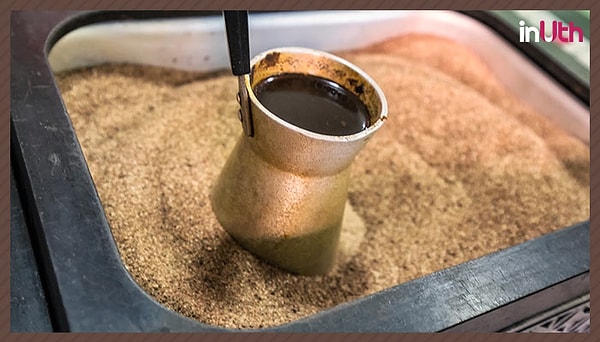Turkish Hot Sand Coffee: A Timeless Delight for the Senses
In the bustling cities and tranquil villages of Turkey, there is a traditional brewing method that has stood the test of time, captivating coffee enthusiasts with its unique preparation process and rich, aromatic flavors. Turkish hot sand coffee, also known as 'cezve' or 'ibrik' coffee, is a captivating ritual that dates back centuries and continues to be cherished as an integral part of Turkish culture. This brewing technique involves the use of finely ground coffee beans, heated in a special pot called a 'cezve' and immersed in hot sand. As the sand gently transfers its heat to the cezve, the coffee slowly simmers, releasing its captivating fragrance and yielding a rich, full-bodied brew that delights the senses. Let us embark on a journey to explore the captivating world of Turkish hot sand coffee, its historical significance, the unique brewing process, and the cultural significance it holds for the Turkish people.
Historical Significance of Turkish Coffee:

Turkish coffee has a long and storied history that can be traced back to the 15th century, when it was introduced to the Ottoman Empire. Originally discovered in the Arab world, coffee quickly gained popularity in the bustling markets of Istanbul and became an integral part of Turkish culture. In fact, the method of preparing and brewing Turkish coffee was added to the UNESCO Representative List of the Intangible Cultural Heritage of Humanity in 2013, a testament to its enduring cultural significance.
Brewing Process:

The process of brewing Turkish hot sand coffee is as captivating as the final result itself. It begins with selecting the finest coffee beans and grinding them to an exceptionally fine consistency, often resembling powdered sugar. The ground coffee is then added to the cezve, a small, long-handled copper pot with a wide base and a narrow neck. The cezve is filled with cold water, and if desired, sugar can be added to the mixture according to individual taste preferences.
The cezve is placed in a bed of hot sand, which is usually heated in a specially designed container called a 'kumdanlık.' The sand acts as a gentle and even heat source, allowing the coffee to simmer slowly without the risk of burning. As the cezve rests in the warm embrace of the sand, the water begins to heat gradually, causing the coffee to blend and infuse its captivating aroma into the surrounding air.
As the water nears its boiling point, the coffee forms a foamy layer on the surface. This foam, known as 'köpük,' is a highly desirable characteristic of Turkish coffee and adds a velvety texture to the final cup. Just as the coffee reaches its boiling point, it is removed from the heat to prevent it from boiling over. The coffee is then allowed to settle briefly before it is poured into small, delicate cups, preserving its intense flavor and delightful aroma.
Cultural Significance:

Turkish hot sand coffee holds deep cultural significance in Turkish society, transcending mere beverage consumption. The preparation and serving of Turkish coffee are considered rituals that bring people together, encouraging conversation, socialization, and the fostering of connections. It is often served to guests as a symbol of hospitality and is an essential component of traditional Turkish ceremonies and celebrations.
Another remarkable aspect of Turkish coffee culture is the art of fortune-telling, known as 'fal.' After savoring the aromatic brew, the coffee grounds that settle at the bottom of the cup are used by skilled individuals to interpret the drinker's future. This centuries-old tradition adds an element of mysticism and intrigue to the coffee-drinking experience, making it a truly captivating cultural practice.
The Flavor Experience:

The sensory experience of sipping Turkish hot sand coffee is a delight to behold. Its distinctive flavor profile and velvety texture set it apart from other brewing methods. Turkish coffee is renowned for its full-bodied richness, robust aroma, and a balanced combination of bitterness and sweetness.
The finely ground coffee beans, being immersed in water for an extended period, extract the maximum flavor from the beans. The slow brewing process allows the flavors to develop gradually, resulting in a concentrated and intense brew. The aroma that wafts from the cup is captivating, with notes of earthiness, chocolate, and subtle hints of spice.

One of the distinguishing features of Turkish coffee is its unfiltered nature. As the coffee is poured into the cup, the fine coffee grounds settle at the bottom, creating a seductive sludge. This sediment not only adds to the richness of the flavor but also enhances the overall texture of the drink. It is customary to let the coffee rest for a moment before taking the first sip, allowing the grounds to settle and the flavors to meld together.
The experience of sipping Turkish hot sand coffee is a multisensory journey. The velvety texture coats the palate, while the complex flavors dance on the taste buds. Each sip is an invitation to indulge in the rich cultural heritage and time-honored traditions that accompany this remarkable beverage.
Modern Adaptations:

While Turkish hot sand coffee remains deeply rooted in tradition, there have been modern adaptations to make it more accessible and convenient for coffee lovers around the world. Electric sand coffee makers have emerged, utilizing heated plates or elements to replace the traditional hot sand bed. These devices mimic the gentle heat transfer of the sand, ensuring a similar brewing experience without the need for specialized equipment.
Furthermore, the popularity of Turkish coffee has expanded beyond Turkey's borders, reaching coffee aficionados in various corners of the globe. Specialty coffee shops and cafes in many countries now offer Turkish coffee on their menus, allowing people to savor the unique flavors and experience the cultural significance it holds.
The Art of Turkish Coffee:

Turkish hot sand coffee is not merely a beverage; it is an art form that requires skill, patience, and an appreciation for tradition. The delicate balance of heat, timing, and technique is crucial in achieving the perfect cup of Turkish coffee. It is an art that is passed down through generations, with experienced coffee makers sharing their knowledge and expertise with the next.
The social aspect of Turkish coffee further enhances its artistic value. It is common to see gatherings where coffee is brewed and shared, allowing people to connect, converse, and build relationships. The preparation and serving of Turkish coffee create an ambiance of warmth, hospitality, and cultural exchange.
Do you like Turkish coffee? Tell us in the comments!
Keşfet ile ziyaret ettiğin tüm kategorileri tek akışta gör!


Send Comment